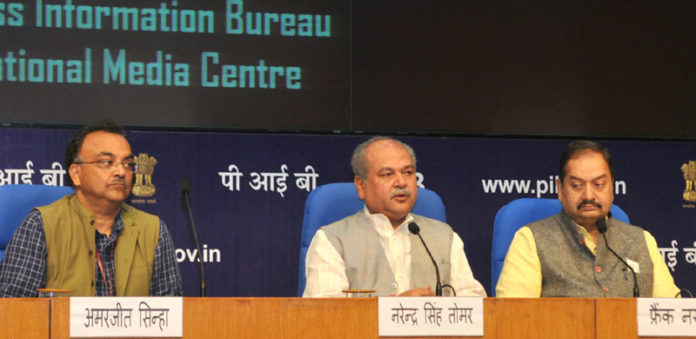Excess production during the sugar season 2017-18 and sugar season 2018-19 has been continuously depressing the ex-mill price of sugar. This has adversely affected the realization on sale of sugar resulting in the accumulation of cane price arrears of farmers for sugar season 2018-19, which reached an alarming level of about Rs. 28,390 crores in April 2019. In order to stabilize sugar prices at a reasonable level and to improve the liquidity of sugar mills thereby enabling them to clear cane price dues of farmers, the Central Government took the following steps during 2019:
In order to prevent cash loss and to facilitate sugar mills to clear cane dues of farmers in time, the Government on 07.06.2018 fixed a minimum selling price (MSP) of sugar at Rs.29/kg for sale at factory gate in domestic market, below which no sugar mill can sell sugar. The government has further increased MSP of sugar from Rs.29/kg to Rs.31/kg with effect from 14th February 2019.
The Government has also notified a soft loan scheme on 02.03.2019 for extending loans to sugar mills through banks to clear cane dues of farmers for sugar season 2018-19, for which Government would bear interest subvention of about Rs 738 crore @ 7% for one year. Under the scheme, soft loans of about Rs. 7402 crores have been disbursed to sugar mills to enable them to clear cane dues of farmers for sugar season 2018-19.
With a view to supporting the sugar sector and in the interest of sugarcane farmers, the Government notified two schemes on 08.03.2019 for extending soft loans of about Rs. 15500 crores through banks to sugar mills and molasses-based standalone distilleries for enhancement and augmentation of ethanol production capacity for which the Government would bear interest subvention amounting to Rs. 3355 crores for five years including moratorium period of one year.
As the current sugar season 2019-20 commenced with huge carry-over/opening stock, which may affect the liquidity position of sugar mills, in order to maintain demand-supply balance, to stabilize sugar prices and to improve liquidity position of sugar mills thereby enabling them to clear cane price dues of farmers, the Government has further taken following measures:
Notified a scheme on 31.07.2019 for the creation and maintenance of buffer stock of 40 LMT of sugar for a period of one year from 1st August 2019 to 31st July 2020 for which the Government is reimbursing carrying cost of Rs.1674 crore towards the maintenance of buffer stock.
With a view to facilitating the export of sugar during the sugar season 2019-20, the Government vides notification dated 12.09.2019 has notified a scheme for providing assistance to sugar mills to meet expenses on the export of 60 LMT of sugar to the extent of Maximum Admissible Export Quantity (MAEQ) for sugar season 2019-20. Under the scheme, the Government would be providing a lump sum assistance @ Rs 10448/MT to sugar mills to facilitate export in sugar season 2019-20 for which an estimated expenditure of Rs 6268 Cr would be borne by Govt.
The Government has allowed the production of ethanol from sugar and sugar syrup for current ethanol supply year 2019-20 (December 2019 – November,2020) and has fixed the remunerative ex-mill price of ethanol derived from C-heavy molasses @ Rs. 43.75/litre; from B-heavy molasses @ Rs. 54.27/ litre and @ Rs. 59.48/litre for the ethanol derived from sugarcane juice/ sugar/ sugar syrup.
As a result of various measures, about 94 % of cane dues for sugar season 2018-19 have been cleared and all-India cane price arrears of farmers have also come down to Rs. 5134 crores (as on 18.12.2019) from peak arrears of Rs.28390 crore on State Advised Price (SAP) basis, and to Rs. 3095 crore from peak arrears of Rs. 25434 crore on FRP basis.
A web portal has been launched for online submission of loan applications for availing various loans provided under SDF by the Sugar Mills.
Department of Food & Public Distribution launches centrally sponsored pilot scheme “Fortification of Rice and its Distribution under Public Distribution System
To address anemia and micro-nutrient deficiency in the country, the Government of India has approved the Centrally Sponsored Pilot Scheme on “Fortification of Rice and its Distribution under Public Distribution System”. Under the scheme, Rice is to be fortified by mixing the normal rice, with the Fortified Rice Kernels (FRK) with added micro-nutrients namely Iron, Folic Acid and Vitamin B-12, in the ratio of 100:1. The Pilot Scheme has been approved for a period of three years beginning 2019-20 with a total budget outlay of Rs.147.61 crores. The Pilot Scheme is to be funded by the Government of India in the ratio of 90:10 in respect of North Eastern, Hilly and Island States and 75:25 in respect of the rest of the States. The Pilot Scheme is to focus on 15 Districts, preferably 1 District per State. The decentralized model of fortification by States/UTs has been approved in the Pilot Scheme with blending at the milling stage. The operational responsibilities for the implementation of the Pilot Scheme lie with the States/UTs. States/UTs have been requested to operationalize the blending of fortified rice and its distribution through PDS as early as possible.
Implementation of Targeted Public Distribution System (TPDS)
Persistent efforts have resulted in the universal implementation of the National Food Security Act, 2013 (NFSA) in all States/UTs, benefitting about 80 Crore persons in the country by providing them access to highly subsidized foodgrains at Rs. 1/2/3 per Kg for Coarse-grains/Wheat/Rice respectively. The prices of foodgrains indicated above were initially valid for a period of three years from the date of NFSA coming into force. Further, as amended from time to time, it was decided to continue with the same issue prices up to 30th June 2019. Thereafter, it has been decided by the Government to keep the issue prices under NFSA unchanged until further orders.
As part of efforts made under the scheme on End-to-End Computerization of TPDS Operations, the digitization of Ration Cards/Beneficiaries under NFSA has been completed in all States/UTs. Further, computerization of Supply Chain Management of foodgrains has been completed in 28 States/UTs.Seeding of Aadhaar numbers with ration cards (at least one member of the beneficiary household) has been completed in nearly 87.6% ration cards in the country. Further, a timeline of up to 31/03/2020 has been given to all States/UTs for completing the linking of Aadhaar numbers with all ration cards under NFSA.
Installation of electronic Point of Sale (ePoS) devices for FPS automation has been completed in nearly 4.7 Lakh (about 88%) out of a total of 5.35 Lakh FPSs in the country. At present, nearly 60% of total foodgrains are being distributed after biometric authentication of beneficiaries on the ePoS devices at FPSs on a monthly basis.
Intra-State portability of ration cardholders, which enables them to lift their entitled foodgrains from any FPS within the State/UT, is operational in 12 States, namely- Andhra Pradesh, Haryana, Karnataka, Kerala, Maharashtra Rajasthan, Telangana, Tripura, Gujarat, Jharkhand, Punjab, Madhya Pradesh whereas it is partially operational in few districts/FPS areas of Uttar Pradesh, Bihar, Chhattisgarh, and Odisha.
Inter-State portability of ration card holders under the ‘One Nation One Ration Card’ plan is also operational in 8 States of Andhra Pradesh, Telangana, Gujarat, Maharashtra, Haryana, Rajasthan, Karnataka, and Kerala (in clusters of 2 adjoining States each). This facility enables the migratory beneficiaries in other States to lift the foodgrains from any ePoS enabled FPS after biometric authentication by using their same/existing ration card.
End-to-end Computerization of TPDS Operations
To modernize and to bring about transparency in the TPDS, the Department is implementing the scheme on End-to-end Computerization of TPDS Operations at a total cost of 884 Crore on a cost-sharing basis with the States/UTs. The Scheme provides for digitization of ration cards & beneficiary records, computerization of supply chain management, setting up of transparency portals and grievance redressal mechanisms.
To identify and weed-out duplicate/ineligible beneficiaries, and to enable rightful targeting of food subsidies, seeding of Aadhaar numbers of beneficiaries with their Ration Cards is being done by States and UTs. Presently, about 86% of all ration cards have been seeded with Aadhar number.
As part of the scheme, electronic Point of Sale (ePoS) devices are being installed at Fair Price Shops (FPSs) for distribution of foodgrains through authentication and electronic record-keeping of the sale transactions. As of date, 4.6 lakh FPSs out of a total of 5.34 lakh FPSs have ePoS devices across the country.
‘Integrated Management of Public Distribution System’ (IM-PDS)
A new Central Sector Scheme is being implemented during FY 2018-19 and FY 2019-20 for establishing Public Distribution System Network (PDSN) to implement national-level portability, central data repository and central monitoring system of PDS operations.
Intra-state portability of ration cards: Facility enabling PDS beneficiaries to lift their entitled foodgrains from any fair price shop in the State where the ePoS device has been installed. Such states are Andhra Pradesh, Haryana, Karnataka, Kerala, Maharashtra, Rajasthan, Telangana, Tripura, Gujarat, Jharkhand, Punjab, Madhya Pradesh and in few FPS areas/districts of Uttar Pradesh, Chhattisgarh, and Odisha.
Inter-State/national portability of ration cards: is presently operational in 8 States i.e. in Four Clusters of 2-adjoining States of Andhra Pradesh &Telangana, Gujarat &Maharashtra, Haryana & Rajasthan and Karnataka & Kerala.
Supporting the Farmer
During Kharif Marketing Season (KMS) 2018-19, a record quantity of 443.99 lakh MT paddy (in terms of rice) was procured against procured of 381.85 lakh MT in KMS 2017-18. During Rabi Marketing Season (RMS) 2019-20, a quantity of 341.33 Lakh MT of wheat was procured. The Government relaxed the procurement norms of Wheat during RMS 2019-20 in unseasonal rainfall affected areas of Punjab, Haryana, Rajasthan, Uttar Pradesh, and Madhya Pradesh.
Movement of Foodgrains
As part of HLC recommendation, FCI made a trial of containerized movement of foodgrains through CONCOR from Chhattisgarh (Raipur) to Maharashtra (Turbhe) in Aug’16 which was extended for further containerized movement from Punjab, Haryana, and AP to recipient States like West Bengal, Jharkhand, Maharashtra, Kerala, Karnataka, Gujarat which was found to be economical in comparison to conventional Railway rakes. During 2019-20, upto Oct,19, 182 containerized rakes has been moved with approx. freight savings of Rs. 424 lakhs.
National Sugar Institute
A patent application on “Production of Bio-methane/Bio-CNG from Filter Cake & Sugar Industry Waste was filed.
Institute signed MoU with National Research Development Corporation for commercialization of technologies.
Institute signed MoU with Faculty of Sugar & Integrated Industries Technology, University of Assiut, Egypt for conducting Customized Training Programmes for professionals from sugar factories of Egypt and carrying out collaborative research on areas of mutual interest.
Delegation from Thailand Sugarcane Board and Chinese Sugar Industry visited the institute to look into its activities and discussing possibilities of availing institute expertise in developing the sugar industry in respective countries.
Institute took steps for establishing a “Mini Sugar Refinery” and “Grain Based Ethanol Unit” at the institute for effective training of the students.
Central Warehousing Corporation
Central Warehousing Corporation has implemented Warehouse Management System (WMS) in all its 380 general Warehouses in the Country w.e.f. 30.08.2019. WMS provides digitisation of Warehousing operations through a real-time MIS System thereby enabling prompt and effective decision making. Further, it improves the visibility of the supply chain for meeting client/ customer demand for transparency and service delivery. This will enhance the quality of integrated Services by eliminating duplication of efforts.
CWC was awarded Container Freight Station Operator of the year (Public) based on the performance of CWC in Cargo and Logistic sectors during South East CEOs Conclave held at Chennai on 03.07.2019.
23 Central warehouses have been declared as ‘Market Yards’ which will function as Mandi Yards and subsequently be linked with eNAM facility in Andhra Pradesh.
CWC has opened a new warehouse of 6000 MT at Chaibasa in Jharkhand.
CWC has been awarded Strategic Alliance Management Operation (SAMO) contract for Container Freight Station (CFS), Impex Park for an initial period of 10 years, further extendable by another 5 years. This facility will generate a fixed revenue of Rs.2.03 crore per annum
CWC has issued an Offer of appointment to 155 candidates for the post of Junior Superintendent in Nov 2019.
Central Railside Warehouse Company Limited
CRWC has signed an MoU with Dedicated Freight Corridor Corporation of India (DFCCIL) on 21.10.2019 for developing railside warehouses/silos / Multi-Model Logistics Parks (MMLP) on the same line of MoU entered into with Indian Railways which will further boost Rail borne traffic.






















